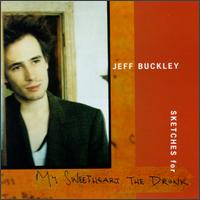

Jeff Buckley
Sketches For My Sweetheart The Drunk (Columbia)
David Garza
This Euphoria (Atlantic/Lava)
by Marc Hirsh


Jeff Buckley
Sketches For My Sweetheart The Drunk (Columbia)
David Garza
This Euphoria (Atlantic/Lava)
by Marc Hirsh
originally published in Space City Rock, Fall 1999
My father listens primarily to classical music, and I remember him telling me once about one of the strangest records that he had ever heard. It was an unfinished symphony (I don't remember whose), and instead of filling in the blanks with what the composer would have written or just stopping where the "unfinished" parts began, the record continued on, playing exactly what had been written and nothing more. My father said that listening as instruments started dropping out one by one (since their parts hadn't yet been scored) until a lone piano remained and then stopped was one of the eeriest musical experiences that he'd ever had.
It wasn't until the third time listening to Sketches For My Sweetheart The Drunk, which is an exact modern analog of the above, that I finally realized that the point behind what I'd previously passed off as a silly goof was one of unequivocal respect for the artist. Culling two CDs' worth of material from Jeff Buckley's attempts to come up with a worthy follow-up to 1994's shockingly good Grace, the compilers of this posthumous release make it clear that this is what Buckley had done, nothing more and nothing less.
The result is awfully creepy for a number of obvious and not-so-obvious reasons. The entire first disc is Buckley's first stab at recording a new album, the one he scrapped for the songs that comprise the second disc. But wait: aren't we listening to an entire album's worth of songs that he didn't want us to hear in the first place? So now we're not only being serenaded from beyond the grave, we're doing it against the poor fella's explicit wishes.
And, naturally, these are the songs that hit hardest, if for no other reason than the fact that they were done when Buckley decided to dive into the Mississippi. I'm a stickler for starting an album off right, and "The Sky Is A Landfill," with its swirling noise wrapped around Buckley's delicate pipes, does its job, recapturing the beauty of Grace and setting us up for the rest of the album, which pulls an immediate changeup with the faux-'70s soul of "Everybody Here Wants You." Throughout the rest of the disc, Buckley seems to have been veering away from the personal directness of Grace, standing outside himself for songs like "Yard of Blonde Girls" and "Witches' Rave." If Buckley'd been satisfied and released just the first disc, it would have been a decent though flawed follow-up. Which is no doubt why Buckley killed it early.
And then, with new versions of the abandoned first attempt's hurricane-like "Nightmares By The Sea" and "New Year's Prayer," disc 2 brings us back to reality, showing us glimpses of what Buckley had in mind when he vanished under the waves. It's here that the unfinished symphony starts unravelling, with demos taking the place of finished songs and instruments dropping out (drums are the first casualty) and Buckley's ambition being laid pretty damn bare. It's rough going; lord knows what Buckley had in mind for these songs, which sound very much like works in progress with possibility. Really, the only of Buckley's demos that shows more than potential, that shows actual goddamn promise realized, is "Jewel Box," which, in this form, comes across as one of Chris Knox's more delicate ballads, if Chris Knox was a rhapsodic romantic (instead of a grounded pragmatist) with a quavering falsetto like nothing else on earth.
Just as the full-bodied and electric "The Sky Is A Landfill" started of a disc of produced and finished work, so the closing "Satisfied Mind," live and solo, caps off a disc of something akin to quiet introspection. As his electric guitar quietly plays its elegaic notes, his voice floats along like a feather on the melody, touching down on it for the most part but darting up or down on the slightest change in the climate. It indicates that Jeff Buckley shuffled off this mortal coil with a clear conscience. But I'll bet he was amused as hell that his epitaph went #1 in Australia.
Meanwhile, if, as my friend Josh so eloquently put it, there has never been a band as aptly named as Garbage, I'll counter by suggesting that no album title has been as appropriate as This Euphoria. While Jeff Buckley descends into melancholy for the sheer tragic romanticism of it, David Garza luxuriates in melody and sound because he is a sex god extraordinaire. I can think of no other explanation for it, and I stand in awe.
Nor can I explain that after 5 years in Houston, my first exposure to Garza was in the cultural molasses factory of Indianapolis, opening for Ani DiFranco. It was unfortunate in more ways than one: performing with guitar and computer, dah-veed squeezed unfocused noise out of the loudspeakers and generally confused the crowd, who probably didn't care anyway.
Mistake. On both sides. Turns out that hearing Euphoria's tunes in concert and then on record is like watching a blur snap into focus (putting on your glasses, for instance, for those who are blind like me). Rumbling low end becomes pounding bass and wall of distortion coalesces into thundering guitar. And it still washes over you, because it's all one unit of glorious sound, propelled by Garza's urgent vocal pleadings.
Like Buckley, Garza possesses a tenor of unhinged beauty, which can swoop and soar and glide and dive in unexpected ways with precision and control. It's just that Garza is too busy trying to woo his beloved (or beloved-to-be) to get bogged down in the depressive poesy that Buckley made his trademark. The promises made in the pulsing "Discoball World" (which would make a glorious dancefloor song, though it'll never happen) get reinforced with a melody that starts out in beautiful simplicity before losing itself momentarily in the prechorus and then, just when you think it'll be wandering for a while, slams into a chorus of breathtaking urgency and confidence. When Garza claims to glow in the dark (in the song of the same name), he doesn't sound like he's bragging; I think he wants to prove it to you.